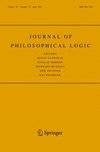Epistemic Logics for Relevant Reasoners
IF 1
1区 哲学
0 PHILOSOPHY
引用次数: 0
Abstract
We present a neighbourhood-style semantic framework for modal epistemic logic modelling agents who process information using relevant logic. The distinguishing feature of the framework in comparison to relevant modal logic is that the environment the agent is situated in is assumed to be a classical possible world. This framework generates two-layered logics combining classical logic on the propositional level with relevant logic in the scope of modal operators. Our main technical result is a general soundness and completeness theorem.
相关推理者的认识论逻辑
我们为模态认识论逻辑提出了一个邻域式语义框架,以模拟使用相关逻辑处理信息的代理。与相关模态逻辑相比,该框架的显著特点是假设代理所处的环境是一个经典的可能世界。这个框架产生了两层逻辑,将命题层面的经典逻辑与模态运算符范围内的相关逻辑结合起来。我们的主要技术成果是一个一般健全性和完备性定理。
本文章由计算机程序翻译,如有差异,请以英文原文为准。
求助全文
约1分钟内获得全文
求助全文
来源期刊

JOURNAL OF PHILOSOPHICAL LOGIC
PHILOSOPHY-
CiteScore
2.50
自引率
20.00%
发文量
43
期刊介绍:
The Journal of Philosophical Logic aims to provide a forum for work at the crossroads of philosophy and logic, old and new, with contributions ranging from conceptual to technical. Accordingly, the Journal invites papers in all of the traditional areas of philosophical logic, including but not limited to: various versions of modal, temporal, epistemic, and deontic logic; constructive logics; relevance and other sub-classical logics; many-valued logics; logics of conditionals; quantum logic; decision theory, inductive logic, logics of belief change, and formal epistemology; defeasible and nonmonotonic logics; formal philosophy of language; vagueness; and theories of truth and validity. In addition to publishing papers on philosophical logic in this familiar sense of the term, the Journal also invites papers on extensions of logic to new areas of application, and on the philosophical issues to which these give rise. The Journal places a special emphasis on the applications of philosophical logic in other disciplines, not only in mathematics and the natural sciences but also, for example, in computer science, artificial intelligence, cognitive science, linguistics, jurisprudence, and the social sciences, such as economics, sociology, and political science.
 求助内容:
求助内容: 应助结果提醒方式:
应助结果提醒方式:


